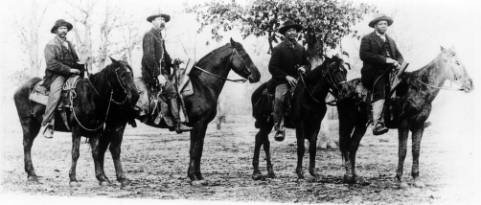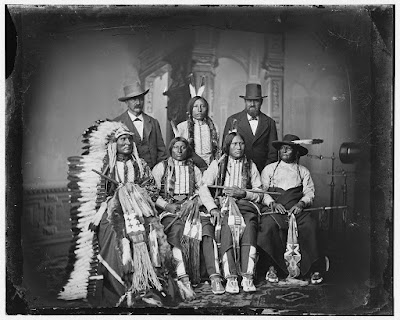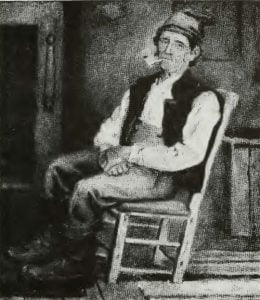American Lawmen and Servicemen of Color
Sergeant John Denny, Co. B, 9th U.S. Cavalry Regiment (second row, first photo);
Milton M. Holland, Sergeant Major, 5th U.S. Colored Troops, Civil War
Holland, Milton M.
ACTION: Chaffin's Farm (Fort Harrison), VA.
DATE: 29 September 1864.
NAME: Holland, Milton M.
RANK/UNIT: Sergeant Major, 5th U.S. Colored Troops.
CITATION: "Took command of Company C, after all the officers had been killed or wounded, and gallantly led it."
MEDAL PRESENTED: 6 April 1865.
BIOGRAPHICAL DATA: Born: Austin, TX. 1844.
ENTERED SERVICE: Athens, Ohio.
PHOTOGRAPH/SKETCH: Yes.
OTHER: Holland was an 18-year-old shoemaker when he enlisted in the U.S. Army. He stood 5'8" tall. Holland and the 5th were present at the famous "Battle of the Crater" in Petersburg, VA on 30 July 1864, but were not used in the disastrous Union charge. At Chaffin's Farm (Fort Harrison), Holland and the 5th suffered heavy casualties during the assault and subsequent hand-to-hand combat. "But, with a courage that knew no bounds, the men stood like granite figures. They routed the enemy and captured the breastworks. The courage displayed by young Holland's regiment on this occasion called for the highest praise from Gen. Grant, who personally rode over the battlefield in company with Generals Butler and Draper."
By order of General Butler, Holland was promoted to Captain, but because of his color was refused the commission by the War Department. Holland was later present when General Joseph E. Johnston C.S.A. surrendered to General William T. Sherman. Sergeant-Major Holland was mustered out of service at Carolina City, NC, on September 20, 1865.
SOURCES:
Medal of Honor Recipients: 1863-1978, Washington: U.S. Government Printing Office, 1979 p. 119.
Mitchell, Joseph B. Lt. Col., The Badge of Gallantry, New York: MacMillian & Co., 1986 pp. 141-3.
Bearss- Edwin C., "Black Medals of Honor Received a New Market Heights, 29 September 1864." National park Service Memo in Richmond NBP files, 2 April 1979.
Davis, William C., Death in the Trenches: Grant at Petersburg. Alexandria, VA Time-Life books, 1986. p. 124.
-----
An order from Gen. Benjamin Butler, dated 11 October 1864, had this to say:
Milton M. Holland, sergeant-major, Fifth U.S. Colored Troops, commanding Company C; James H. Bronson, first sergeant, commanding Company D; Robert Pinn, first sergeant, commanding Company I, wounded; Powhatan Beaty, first sergeant, commanding Company G, Fifth U.S. Colored Troops--all these gallant colored soldiers were left in command, all their company officers being killed or wounded, and led them gallantly and meritoriously through the day. For these services they have most honorable mention, and the commanding general will cause a special medal to be struck in honor of these gallant colored soldiers.
Official Records, #89, p168.
-----
During the war, Holland wrote to, and was published in, his local newspaper, the Athens, Ohio Messenger. Here are two of his war-time letters.
Holland Letter 1
|
Norfolk, Va. Dear Messenger: You will be reminded of the company of colored soldiers raised by myself in the county of Athens, [Ohio], and taken to Camp Delaware, 25 miles north of Columbus, on the Olentangy. It has since been mustered into the service in the 5th Regt. U.S. Colored Troops. The regiment is organized, and has been in active service for three months. Our company is C-the color company-in which you may remember of the flag presentation, made by the kind citizens of Athens, through Mr. Moore, at which Mr. [John Mercer] Langston was present and received it, pledging in behalf of the company, that they would ever be true to the flag, though it might be tattered or torn by hard service, it should never be disgraced. I am happy to say that those colors have been used as the regimental colors for several months, and we had the honor of forming the first line of battle under their floating stars. We now have new regimental colors, and the old ones are laid away in my cabin, and I am sitting now beneath them writing. The regiment though young, has been in one engagement. The men stood nobly and faced the cowardly foe when they were hid in the swamp firing upon them. They stood like men, and when ordered to charge, went in with a yell, and came out victorious,losing four killed and several wounded. The rebel loss is large, as compared with ours. As for company C she played her part admirably in the charge. Our 4th sergeant, Charles G. Stark, is said to have killed the picket guard while in the act of running away. I must say of the 5th, that after twenty days of hard scouting, without overcoats or blankets, they returned home to camp, which the soldiers term their home, making twenty-five and thirty miles per day. Several of the white cavalry told me that no soldiers have ever done as hard marching through swamps and marshes as cheerfully as we did, and that if they had to follow us for any length of time it would kill their horses. During that raid, thousands of slaves belonging to rebel masters were liberated. You are aware that the colored man makes no distinction in regard to persons, so I may say all belonging to slaveholders were liberated. We hung one guerilla dead, by the neck, by order of Brig. Gen. Edward] A. Wild, a noble and brave man, commanding colored troops--the right man in the right place." He has but one arm, having lost his left one at the battle of Antietam, but with his revolver in hand, he was at the head of our regiment cheering us on to victory. One of the boys belong to Co. D was captured and hung. He was found by our cavalry pickets yesterday and is to be buried today. We hold one of their "fair daughters," as they term them, for the good behavior of her husband, who is a guerilla officer, toward our beloved soldiers. The soldier was found with a note pinned to his flesh. Before this war ends we will pin their sentences to them with Uncle Sam's leaden pills. The boys are generally well, and satisfied that though they are deprived of all the comforts of home, and laboring under great disadvantages as regards pay and having families to support upon less wages than white soldiers, still trust that when they do return they will be crowned with honors, and a happier home prepared for them, when they will be free from the abuses of northern and southern fire-eaters. Though we should fall struggling in our blood for right and justice, for the freedom of our brothers in bondage, or fall in defense of our national color, the Stars and Stripes, our home and fireside will ever be protected by our old friend Gov. [David] Tod, by the loyalty of Abraham Lincoln, our Moses, and the all-wise God that created us. Friends at home be cheerful, cast aside all mercenary compensation. Spring forth to the call and show to the world that you are men. You have thus far shown, and still continue to show yourselves worthy of freedom, and you will win the respect of the whole nation. There is a brighter day coming for the colored man, and he must sacrifice home comforts if necessary to speed the coming of that glorious day. I will close my letter in the language of the immortal Henry-"Give me liberty, or give me death!" Yours truly, Milton M. Holland |
Holland Letter 2
|
Near Petersburg, Virginia July 24, 1864 Dear Messenger: It has been sometime since I had an opportunity to address you. I thought that I should like to communicate through your columns to the friends of the soldiers in Co. C. 5th U. S.C.T., to which I belong. I will commence by stating as I did in my previous communication that Co. C, is principally composed of men from Athens and Ross Counties, and have been in active service since entering the Department of Virginia and North Carolina, liberating the slaves of both loyal and disloyal masters, and likewise confiscating other property of those who have neglected to take the oath of allegiance to the Government of the United States. Never have we seen a day, however disagreeable the weather might be, that we would not go to the assistance of our brothers in bondage, and sever the chain that bound them. While, I mention that we are engaged in this glorious work, I must not neglect to say that we did not pass the guerillas who lurk in swamps and thickets unmolested. As it is not the style of Black Warriors to allow themselves to be trifled with, you may understand that we disposed of them according to the rules for the disposition of such warriors. We have been successful in achieving the object we aimed at. We have also undergone severe marches to Bottom Bridge, within twelve miles of the Confederate Capitol. On some of those marches it rained incessantly, making it very fatigueing. I have also seen men sleep, while marching. If I should say that I have been guilty of the same art myself it would not be less than truth. It seemed like imposing on green troops, but the boys bore it admirably with great patience and endurance. Near the latter part of April, we were ordered to Fort Monroe to organize into the 3d division of the 18th Army Corps, commanded by Brigadier Gen. [Edward Ward] Hinks. While at Fort Monroe were reviewed by Maj. Gen. [Benjamin Franklin] Butler, and was classed among the best grade of white troops. All passed off very nicely, until about the 4th day of May, when an order came to break camp, and be ready at moments warning by transports, which we quietly did in good order, as all good soldiers do. We were then awaiting the orders of the Adjutant to fall in. The Adjutant with a loud voice sang out fall in fifth; the companies were formed and moved out on the parade ground and was formed in line of battle under supervision of the Adjutant. We moved off by the right flank to the transports and embarked. shoved in the bay a short distance from the fort, and cast anchor for the night to wait for the fleet to gather. About daybreak on the following morning all was ready, and we set sail for the James River, the fleet of gunboats taking the advance. Immediately in rear were the boats of General Butler and Hinks followed by the fifth U.S.C.T. Many things attracted our attention along the banks of the James, too numerous to mention. One I might mention particularly, was the ruins of Jamestown, the spot where the curse of slavery was first introduced into the United States. A serpent that has inserted his poisonous fangs into the body of this government, causing it to wither in its bloom. Slowly we worked our way up the winding James, until within sight of the City Point celebrated for being the Department where the exchange of prisoners is made. As we neared the shore at that point Co. C was ordered to take the advance as soon as we landed. Up the hill we marched to where the rebel flag was stationed. Down with it cried the boys, and in a moment more the flag of the glorious free could be seen floating in the breeze. The company banners was the first company flag that waved over the rebel city. Forty prisoners were captured at this place by the provost guard of the division. One platoon of our company was deployed as skirmishers and followed a short distance the retreating foe that escaped. On the following day we began throwing up fortifications around the city, in less than sixteen days we had completed the works and was ready for some new adventure. The regiment then moved to Point of Rocks and on the 9th of June a detachment of the 1st, 5th, 6th [U.S.C.T.] under Gen. [Quincy A.] Gilmore made a demonstration against Petersburg, Va., we were brought into line of battle, under a most galling fire of the enemies guns, the 1st U.S.C.T. took the right, the 6th the left, and our detachment supported the artillery, in this order we advanced, while Gen. [August V.] Kautz with a superior force of cavalry made a flank movement and broke the enemies left reaching the town. Had he been supported by General Gilmore the town would have been ours on that day, with slight loss of life. But did he do it? No. He withdrew without a fight, putting the enemy on his guard and consequently allowing him to prepare for an emergency. Suffice to say that we withdrew and fell back to Point of Rocks. All passed off very quietly until the 14th, when we were summoned to make a second demonstration against the rebel city under command of Maj. Gen. [William F.] Smith. In a few moments we were out and on the road, we crossed the Appomattox shortly after nightfall, and lay down to rest our weary limbs. On the following morning about daybreak, we dispatched a hardy breakfast of hardtack and coffee. Orders were given then to fall in, of course we made no delay knowing duty to be before everything else, a moment before and the column was off. About sunrise our advance came in contact with the rebel pickets who discharging the contents of their pieces into our ranks, fled back to their main force. Skirmishers were then thrown out in front of the different regiments. Companies C and B were deployed in front of the 5th, other skirmishers in front of their respective regiments, forming a skirmish line in front of the line of battle. We moved forward slowly making our way clear and open, we advanced about a mile in this manner till in sight of the first line of earthworks. We were then in the open field, halted, where we kept up a brisk fire on the skirmish line until the regiments could get through the swamps and form in order again. All this while the enemy poured a galling fire of musketry, grape and canister into ranks slaying many. The order was given to forward the skirmish line one hundred paces, this being done we halted, keeping up our fire along the line. One thing that I must mention which attracted the attention of the whole division. It was that brave and daring but strange personage that rides the white charger. We could see him plainly riding up and down the rebel lines, could hear him shouting from the top of his voice to stand, that they had only niggers to contend with. This peculiar personage seems possessed with supernatural talent. He would sometimes ride his horse with almost lightning speed, up and down his lines amid the most terrific fire of shot and shell. But when the command was given to us, "Charge bayonets! Forward double quick!" the black column rushed forward, raising the battle yell, and in a few moments more we mounted the rebel parapets. And to our great surprise, we found that the boasted Southern chivalry had fled. They could not see the nigger part as the man on the white horse presented it. We captured here one gun and caisson. Column moved out to the left in front of the second line of fortifications while the white troops took the right. We moved off in line of battle, took a position right in range of the enemies guns, in which position we remained six hours exposed to an enfilading fire of shot and shell. Just at nightfall after the placing of our guns had been effected, we were ordered to charge a second fort which we did with as much success as the first. It is useless for me to attempt a description of that evening cannonading. I have never heard anything to equal it before or since for a while whole batteries discharge their contents into the rebel ranks at once, the result was complete success. Providence seemed to have favored us on that occasion for the casualties of Co. C, were very few only two killed and nine wounded.... Many more of the boys in the company were struck or scratched by spent and glancing balls, but not seriously hurt.... These were brave boys, and the company lament their misfortune and sympathize with the bereaved wives and friends of the deceased.... M. M. Holland O.S., Co. C. 5th U.S.C.T. |
Photo 1: Du Bois, W. E. B. (ca. 1900). Medal of honor men Have received medals of honor in United States Army and Navy.
United States Paris France, ca. 1900. [Photograph] Retrieved from the
Library of Congress, https://www.loc.gov/item/2001695575.
Photo 2: Milton M. Holland. Retrieved from Library of Congress, is in the public domain.
Photo 3: Milton M. Holland. Christian A. Fleetwood, his friend Milton M. Holland, head and shoulders, facing right, in uniform. Retrieved January 30, 2021 from the Library of Congress, https://www.loc.gov/item/2006684595.
Photo 4: Du Bois, W. E. B. (ca. 1900) Christian Fleetwood, head-and-shoulders portrait, facing slightly left. , ca. 1900. [Photograph] Retrieved from the Library of Congress, https://www.loc.gov/item/97506113.
Photo 5: Sarah Fleetwood. Christian A. Fleetwood, his wife Sarah Fleetwood, oval bust, facing left. [No Date Recorded on Caption Card] [Photograph] Retrieved from the Library of Congress, https://www.loc.gov/item/2006684594.




.jpg)






